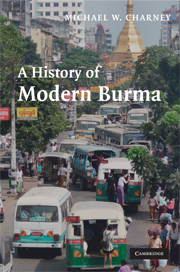Book contents
- Frontmatter
- Contents
- List of figures
- List of maps
- Chronology
- Abbreviations
- Introduction
- Chapter 1 Burma under colonial rule
- Chapter 2 The colonial center
- chapter 3 Self-government without independence, 1937–1947
- Chapter 4 The democratic experiment, 1948–1958
- Chapter 5 Dress rehearsals, 1958–1962
- Chapter 6 The Revolutionary Council
- Chapter 7 The BSPP years
- Chapter 8 Toward democracy, 1988–1990
- Chapter 9 Perpetual delay, 1990 to the present
- Conclusion
- Notes
- Readings
- Index
Conclusion
Published online by Cambridge University Press: 05 February 2015
- Frontmatter
- Contents
- List of figures
- List of maps
- Chronology
- Abbreviations
- Introduction
- Chapter 1 Burma under colonial rule
- Chapter 2 The colonial center
- chapter 3 Self-government without independence, 1937–1947
- Chapter 4 The democratic experiment, 1948–1958
- Chapter 5 Dress rehearsals, 1958–1962
- Chapter 6 The Revolutionary Council
- Chapter 7 The BSPP years
- Chapter 8 Toward democracy, 1988–1990
- Chapter 9 Perpetual delay, 1990 to the present
- Conclusion
- Notes
- Readings
- Index
Summary
In its modern history, Burma has been shaped and reshaped over again by different governments in the context of significant pressures emanating from both within and without the country. Despite its diverse and challenging historical experience, one is often struck by how little Burma appears to have changed, especially in relation to its more politically dynamic and economically more prosperous neighbors in the region. The Burmese today are just as unhappy with their government as earlier generations; economic poverty continues to figure as prominently among Burmese concerns as it has at any time in the past. Basic civil liberties are denied today as they were almost a half-century ago. Continuity has characterized some of the basic themes of modern Burmese history that have transcended the phases of the Burmese experience outlined in this book and contribute to something that might be called the rhythm of Burmese history.
Among the most vexing issues that have plagued the country since the colonial period has been the relationship between the Burman-dominated lowlands and the ethnic minority-dominated highlands. What, after all, is Burma and who are the Burmese? Before colonial rule, the Burmese throne considered the highlands to be part of the royal kingdom, but not of the Burman “country.” Under the last Burmese dynasty, highland states were ruled by autonomous, tributary chiefs (in the Shan case, sawbwas), separated from lowland centers under the control of direct appointees of the Burmese court. Political anxieties rather than ethnic ones dominated conflicts, although cultural, linguistic, and other differences among the diverse peoples that made up the kingdom were indeed recognized.
- Type
- Chapter
- Information
- A History of Modern Burma , pp. 201 - 207Publisher: Cambridge University PressPrint publication year: 2009

